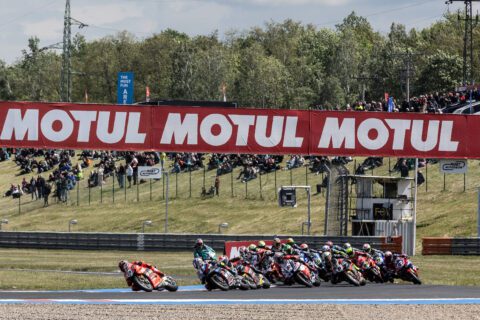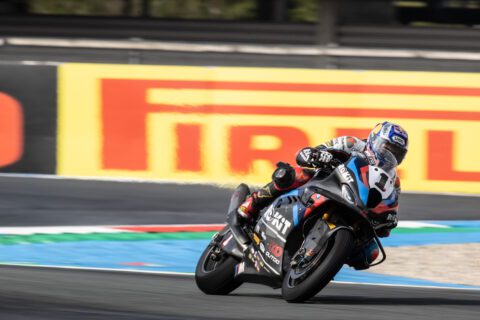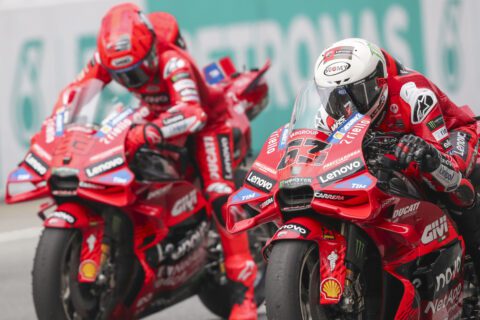Excuses being made by Kawasaki following their, and Tom Sykes, defeat at the hands of Aprillia is surely not doing their brand any favours. Particularly their attempt to cover up their own inadequacies by blaming one of their own riders, a fast young Frenchman called Loris Baz.
Let's be clear. Sykes could have, and should have, retained his World Superbike crown had his bike not been difficult, if not impossible, to ride in the wet costing them valuable points midway through the season And if the team management had not adopted a defensive strategy against an Italian team who, as the season wore on. had nothing to lose and took risks.
Should Kawasaki have been less risk averse? It is very easy to be wise after the event, but under the ten engine rule they had power plants to spare going into the last rounds. But it seems they continued the policy of ensuring they did not run out as they had points in hand.
Aprillia, on the other hand, had to attack. And they did whatever they could with their remaining engines to give their riders the best chance. The speed differential - top speed 325kph, some 10kph faster than anybody else on the long straight - was there for all to see in qualifying.
Could, should, Kawasaki have changed their tactics? The more thoughtful in their garage, ie those not baying for the blood of Baz, thought so. But it was more convenient to blame the French youngster for not obeying team instructions to slow down on that final lap allowing Sykes to take second place.
The 22 year old said, not entirely convincingly, that he was doing it for the team in his side of the garage. More likely he hadn't forgotten being accused of taking team-mate Sykes out in an earlier round when, as he claimed, he just made a mistake and Sykes happened to be the victim. What goes around comes around.
Team orders, as we have discussed before, raises an important point of principal. Fixing a race, and this is what we are talking about here, gets the participants sent to jail in many sports where personal gain can be proved, often/always where betting is involved. But whether betting is involved or not it is cheating. And who is being cheated? The spectators who, in their innocence, come to see the best man winning.
So is it fair to vilify young Baz a) for knocking Sykes off when he was just trying too hard and b) for not following instructions which, in the opinion of this observer, are morally indefensible. Team orders - sometimes jocularly known as taking one for the team - has long been part of the motor sport game. But, as we see here and in the Hamilton/Rosberg palaver in F1 it is a farce. It should be banned by the FIM now on the simple basis that not only should the best man win but should be seen to be winning.
Murray - a real mint...
Guest of honour at the annual TT Riders' Lunch last week was a man who, although never winning a TT or even competing in one, is more famous than most who did. Murray Walker was the radio voice of the TT, a voice made permanent by those wonderfully evocative Stanley Schofield LPs still adorning the shelves many an enthusiasts home.
Murray Walker is 91 years-old. His exposure to Honda sixes and Ferrari V8s have impaired his hearing; a fall earlier in the year fractured his pelvis; a form of cancer was discovered, sorted by a course of chemotherapy; and yet he looks, and is, fitter than most 60 and 70 year olds. He is amazing.
He was, of course, born into privileged family. Privileged that is, because his father was Graham Walker, winner of the Lightweight TT in 1932, and subsequently better known as the voice which made the Isle of Man famous in those days when the TT was the greatest race in the world and was broadcast live on national radio - the ONLY broadcast medium!
So he was born into motorcycle racing but World War Two interrupted everything. A brief
spell with Dunlop was followed by the army; a tank regiment, the Fourth Armoured Brigade; and plenty of action, attaining the rank of Captain.
When it was all over he took a job with advertising agency Masius which had Dunlop as a client. More interestingly they also had Mars and while Murray denies thinking up the slogan "A Mars a day makes you work, rest and play" he admits having something to do with it.But he did think up such delights, so it is said, as "Trill, makes budgies bounce with health" and "Opal fruits, made to make your mouth water."
But it was not such creative genius which made Murray famous. Setting a aside, if we can, the deep knowledge and boundless enthusiasm for the sport he covered, it was the Murrayisms which created such great affection. He certainly had more than his share of the commentators curse, the ability to suggest one outcome which would immediately result in something entirely different happening. He was human and describing events as they are happening is a tricky business.
Murray covered all sorts of motor sport for television including motocross - scrambling as it was them known - and auto cross. It was at one such event at Lydden where Murray was describing the difficult conditions and lauding the ability of a particular driver, who was leading, to apparently have an amazing ability to see through a windscreen totally caked in mud. It took only a few seconds to charge head on into a huge mudbank. End of his race as Murray groaned: "What did I say!"
His view of his role as a commentator was not to tell the enthusiasts what they already knew but to appeal to the non-committed:"I wanted to grip them by the throat and say - 'I love it and you ought to love it to. And here's why!'"
A belated happy 91st birthday Murray. Oh that we had more like you today.
Wheels coming off
We two-wheel enthusiasts always enjoy poking fun at four-wheel types. It's partly envy, partly because we see ourselves as some sort of oppressed minority but also that we see ourselves as a family bound together by something, whether it be background or upbringing, which is not clearly definable.
So when we read of the troubles which are afflicting Formula 1 - we would like their troubles I hear someone saying - it gives us a rather grim sense of satisfaction. Two teams have gone bust, others may follow and all because they can't afford the £100m or so it takes to run a team. Attempts have been made to put a cap on costs but the top five teams, who spend £200m+ a year, will have none of it. They say that poor old Bernie (83), formerly of Kerbside Motors, Sidcup, should get his act together and raise more money.
To most of us, the idea that the posh boys of F1 are struggling to raise money is laughable. But it's all relative to the size of the industry compared to ours, value of advertising and tv rights, and the amounts circuits/countries are prepared to pay in bringing the circus to town. F1 revenue is circa £1bn per year, the owners, private investors CVC and others including the redoubtable Bernie, take half that and the teams share the rest - that is, if you're in the top ten. Ferrari take the lions share, because they've been around the longest, the tenth will get a fraction. The rest - zilch which is why they're going bust and the grid getting smaller to the point where allowing the big teams to field three cars was suggested. And TV audiences have declined 10% this year.
MotoGP is about one tenth the size and has a different reward system. But it is also owned by private investors and the management. They take a lot of money out but it is to the credit of Carmelo Ezpeleta and Dorna, following a bout of arm wrestling with the manufacturers, that they have a graduated formula which will make it less expensive to put a private team on the grid and be competitive. Not this year, maybe not even next but possibly by 2016. And they claim that attendances and TV audiences are increasing, except in the UK where the switch from the BBC to BT delivered a mighty multiple of money but a fraction of the audience.
Even so, you won't to it for less than £5m if you're buying an engine or bike from Yamaha or Honda and hope to finish in the top ten. Paul Bird, who's not short of a bob or two, tried valiantly and deserves credit, with Michael Laverty, for getting on the points table. But it is not for the faint-hearted or those not prepared to lose a few million in the process.


![Shane Byrne, Monstermob Ducati, 2003 WorldSBK, action [Gold & Goose]](https://bikesportnews.com/wp-content/uploads/2025/07/Shane-Byrne-Monstermob-Ducati-2003-WorldSBK-action-Gold-Goose-480x272.jpg)







